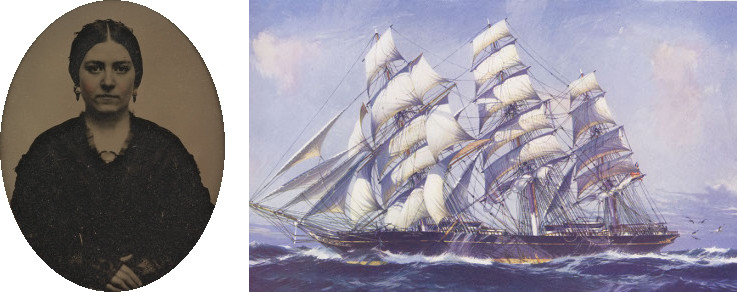190-Mary Patten and the Neptune's Car
Futility Closet
Greg Ross
4.8 • 748 Ratings
🗓️ 26 February 2018
⏱️ 32 minutes
🧾️ Download transcript
Summary

In 1856, an American clipper ship was approaching Cape Horn when its captain collapsed, leaving his 19-year-old wife to navigate the vessel through one of the deadliest sea passages in the world. In this week's episode of the Futility Closet podcast we'll tell the story of Mary Patten and the harrowing voyage of the Neptune's Car.
We'll also consider some improbable recipes and puzzle over a worker's demise.
Intro:
In 1943, the U.S. considered releasing glowing foxes in Japan to frighten Shintoists.
Rice University chemist James Tour fashions stick figures from organic molecules.
Sources for our feature on Mary Patten:
Paul W. Simpson, Neptune's Car: An American Legend, 2018.
Glenn A. Knoblock, The American Clipper Ship, 1845-1920, 2014.
Sam Jefferson, Clipper Ships and the Golden Age of Sail, 2014.
David Cordingly, Seafaring Women, 2010.
Jane D. Lyon, The Great Clippers, 2016.
Bill Caldwell, Rivers of Fortune, 2002.
Julie Baker, "The Troubled Voyage of Neptune's Car," American History 39:6 (February 2005), 58-65.
Raymond A. Rydell, "The California Clippers," Pacific Historical Review 18:1 (February 1949), 70-83.
Ann Whipple Marr, "Mary Ann Brown Patten," Oxford Dictionary of American National Biography, Dec. 2, 1999.
"Neptune's Car," Ships of the World, 1997, 356.
Kenneth J. Blume, Historical Dictionary of the U.S. Maritime Industry, 2012.
"Mary Patten, 19 and Pregnant, Takes Command of a Clipper Ship in 1856," New England Historical Society (accessed Feb. 2, 2018).
"The Story of Mary Patten," National Sailing Hall of Fame (accessed Feb. 2, 2018).
"Women in Maritime History," San Francisco Maritime National Historical Park, National Park Service (accessed Feb. 2, 2018).
Alan Flanders, "Clipper Neptune's Car Saved From Disaster by Quick-Learning Wife of Stricken Skipper," [Norfolk] Virginian-Pilot, Oct. 15, 2000, 3.
George Tucker, "Woman's Touch Helped Clipper Ship Make History," [Norfolk] Virginian-Pilot, Nov. 14, 1999, B3.
Joanne Lannin and Ray Routhier, "The Ladies of Maine," Portland Press Herald, March 13, 1996, 1C.
"A Noble Woman," Sailor's Magazine, April 1857.
"A Heroine of the Sea," Friends' Intelligencer 14 (1857), 46-47.
"A Heroine Arrived -- The Young Wife Who Took Neptune's Car Around Cape Horn," New York Times, March 18, 1857.
"A Wife Worth Having," New York Times, Feb. 21, 1857.
"Report of the Select Committee on the Rights of Married Women," Journal of the House of Representatives of the State of Ohio, 1857, 110.
"Modern Female Heroism," Annual Register, March 1857.
"The Heroic Mrs. Patten," Boston Evening Transcript, June 23, 1857.
"Marine Matters," New York Times, March 24, 1857.
"Neptune's Car," New York Times, July 27, 1857.
"Funeral of Capt. Joshua A. Patten," New York Times, Aug. 31, 1857.
"Personal," New York Times, Sept. 23, 1857.
"Marine Matters," New York Times, March 20, 1857.
"Personal," New York Times, March 20, 1861.
Listener mail:
Jeffrey Gettleman and Kai Schultz, "India's Punishment for Plant-Eating Donkeys: Jail Time," New York Times, Nov. 28, 2017.
Faiz Siddiqui, "Donkeys Destroy Plants, 'Jailed' for 4 Days in Orai," Times of India, Nov. 28, 2017.
"50,000 Meows by @hugovk," github, Nov. 1, 2014.
"Delicious Recipes," scootah.com (accessed Feb. 23, 2018).
Wikipedia, "Echo Answer" (accessed Feb. 23, 2018).
Lindsay Flint sent this example of answering yes/no questions in Welsh.
This week's lateral thinking puzzle was contributed by listener Gillian Brent.
You can listen using the player above, download this episode directly, or subscribe on iTunes or Google Play Music or via the RSS feed at http://feedpress.me/futilitycloset.
Please consider becoming a patron of Futility Closet -- on our Patreon page you can pledge any amount per episode, and we've set up some rewards to help thank you for your support. You can also make a one-time donation on the Support Us page of the Futility Closet website.
Many thanks to Doug Ross for the music in this episode.
If you have any questions or comments you can reach us at [email protected]. Thanks for listening!
Transcript
Click on a timestamp to play from that location
| 0:00.0 | As fans of history, we're excited about a new podcast being launched by the Great Courses Plus called Food, a cultural culinary history. |
| 0:07.5 | It's a fascinating look at food as a driving factor in history, from cave people to the present day. |
| 0:12.7 | You can learn interesting food facts, try delicious historical recipes, and more. |
| 0:17.7 | Just search for food, a cultural culinary history on Apple Podcasts, Google Play, |
| 0:22.4 | or wherever you get your podcasts today. |
| 0:34.7 | Welcome to the Futility Clause podcast, forgotten stories from the pages of history. |
| 0:39.7 | Visit us online to sample more than 10,000 quirky curiosities from glowing foxes to molecular people. |
| 0:46.3 | This is episode 190. I'm Greg Ross. |
| 0:48.6 | And I'm Sharon Ross. In 1856, an American clipper ship was approaching Cape Horn when its captain collapsed, |
| 0:56.6 | leaving his 19-year-old wife to navigate the vessel through one of the deadliest sea passages in the world. |
| 1:02.3 | In today's show, we'll tell the story of Mary Patton and the harrowing voyage of the Neptune's car. |
| 1:08.3 | We'll also consider some improbable recipes and puzzle over a worker's demise. |
| 1:17.6 | On July 1, 1856, a clipper ship called the Neptune's car set out from New York for San Francisco |
| 1:26.4 | carrying a cargo of iron, sheet lead, |
| 1:28.7 | and mining machinery for the California goldfields. Its captain was Joshua Patton, 28 years old. |
| 1:34.5 | He'd command a crew of three dozen men on the trip down the Atlantic around Cape Horn at the |
| 1:38.7 | bottom of South America and up through the Pacific to California, a journey of 15,000 miles. |
| 1:44.1 | In those days, if several |
| 1:45.1 | clipper ships left port at the same time, it was common for them to compete in a friendly |
| 1:48.7 | race to their destination. In this case, Patton would be racing two other famous clippers, |
| 1:53.5 | the intrepid and the romance of the seas. The race between them was good-natured, but the pressure |
| 1:58.0 | for speed was real. A captain might earn $3,000 for a |
... |
Please login to see the full transcript.
Disclaimer: The podcast and artwork embedded on this page are from Greg Ross, and are the property of its owner and not affiliated with or endorsed by Tapesearch.
Generated transcripts are the property of Greg Ross and are distributed freely under the Fair Use doctrine. Transcripts generated by Tapesearch are not guaranteed to be accurate.
Copyright © Tapesearch 2025.

